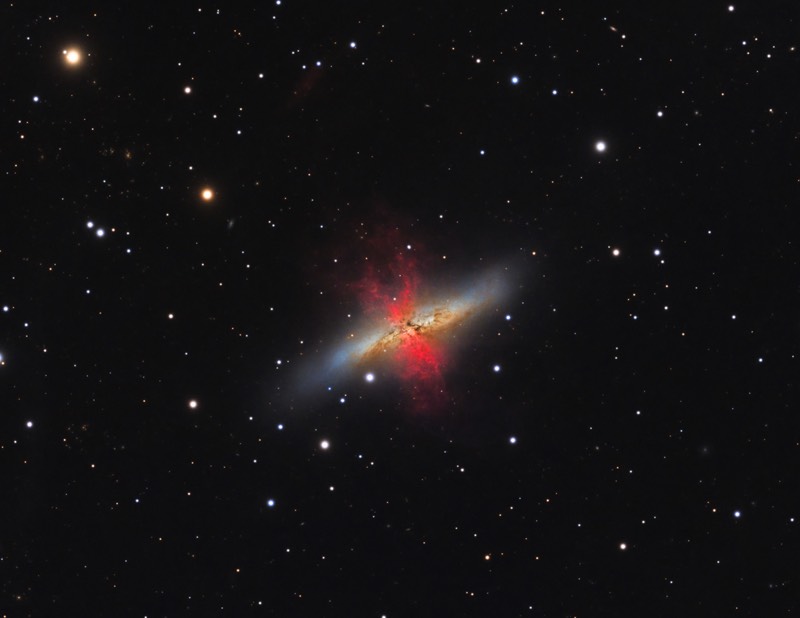Starburst Galaxy M82
Published 9 Feb 2022
About this object
The beautiful starburst galaxy M82 is located in the constellation Ursa Major. It was discovered in 1774 by German Astronomer Johann Elert Bode. Bode also discovered nearby M81, also known as Bodes Galaxy.
M82 is undergoing a huge amount of star formation in its core and due to this massive star formation, emits large amounts of hydrogen gas, seen here in red HII light. A possible theory is that gravitational interactions are occurring with the close neighboring galaxy, M81, and are causing this massive star formation to occur.
Also within the image is a bow shock like feature, called the CAP, which is above M82 and near the top of the image. It's a faint red area of HII emission. This feature was discovered in the late 90's and published in 1999. You can find the paper here. A great discussion about this massive amount of material streaming from M82 can be found here: ap130704.html. There are also a bunch of faint background galaxy clusters in the background and if you look at the high res image you can see them in the background.
M82 is approximately 12 million light years distant and about 1/2 the size of our Milky Way galaxy. M82 shines at an apparent magnitude of 8.4.
The image is a LRGB and Ha composite. I started imaging M82 in April of 2021 and finished in January of 2022. It was shot at 1x1 binning at an image scale of .64 arcsec/pixel. To get a high resolution view of M82, click on the image above.
The beautiful starburst galaxy M82 is located in the constellation Ursa Major. It was discovered in 1774 by German Astronomer Johann Elert Bode. Bode also discovered nearby M81, also known as Bodes Galaxy.
M82 is undergoing a huge amount of star formation in its core and due to this massive star formation, emits large amounts of hydrogen gas, seen here in red HII light. A possible theory is that gravitational interactions are occurring with the close neighboring galaxy, M81, and are causing this massive star formation to occur.
Also within the image is a bow shock like feature, called the CAP, which is above M82 and near the top of the image. It's a faint red area of HII emission. This feature was discovered in the late 90's and published in 1999. You can find the paper here. A great discussion about this massive amount of material streaming from M82 can be found here: ap130704.html. There are also a bunch of faint background galaxy clusters in the background and if you look at the high res image you can see them in the background.
M82 is approximately 12 million light years distant and about 1/2 the size of our Milky Way galaxy. M82 shines at an apparent magnitude of 8.4.
The image is a LRGB and Ha composite. I started imaging M82 in April of 2021 and finished in January of 2022. It was shot at 1x1 binning at an image scale of .64 arcsec/pixel. To get a high resolution view of M82, click on the image above.
Image Details
- Optics : Stellarvue SVX 152T refractor @f8 1200mm FL
- Mount: Paramount MYT
- Camera: ZWO ASI6200
- Filters: Chroma 50mm LRGB, Astrodon 50mm 5nm Ha
- Exposure (min): LRGBHa 366:185:200:200:1120 34.5 hrs, 1x1 binning 1/2 frame
- Automation Control: The Sky X, Voyager, PrimaluceLab Eagle 4
- Guiding: StarlightXpress Lodestar X2
- Processing Software: PixInsight, PS CC, Topaz Labs
- Location: Stark Bayou Observatory, Ocean Springs, MS
- Sky: Typical SQM 19.6-20.1, Bortle 5, Suburban
- Date: 25April - 26 May 2021, 14 Nov - 13 Jan 2022







